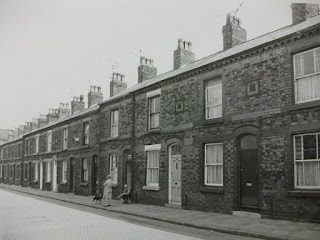Early in 1903 Elizabeth Sturgeon, the 36 year old wife of a drapers buyer who lived at 7 Dudley Road, gave birth to a stillborn baby. Devastated by this loss, she sought to adopt one and in June of that year answered an advert in the Liverpool Echo from someone in Litherland looking to take a baby off their hands.

Sturgeon showed great affection for the four month old baby girl who she christened Mabel. In early July she visited her parents in Lincolnshire where she acquired the services of a girl called Alice Porter who returned to Liverpool with her to help as a housekeeper and nanny.
On Tuesday 28th July Sturgeon acted very strangely, taking the unusual step of sending Alice to buy gin for her. She had a lie down and told her husband that she was in a vile temper, then wrote a letter to her parents saying that she was going to have a 'last walk' due to the cruelty of her husband who had tried to strangle her so he could live with a flower girl.
Sturgeon took Alice and Mabel out with her at 4pm on a long walk that ended up with them sat under a hedge in a field near Mossley Hill church The baby was crying in a strange fashion and Alice expressed concern to Sturgeon that she may suffocate the child when she put a handkerchief in her mouth to try and stop this. Alice then fell asleep after Mabel had gone quiet, having been given a small drop of rum by Sturgeon.
In the morning, Sturgeon offered Alice a shilling as an inducement to walk across the parapet of a railway bridge. She did so but when halfway across she fell thirty feet, but was lucky to suffer only a sprained ankle. Sturgeon told Alice to remain where she was and she would return the baby home then get help, but she was gone some time. When she did return, she told Alice that a woman was looking after Mabel and when she could find no trace her, reported the baby to the police as missing.
Nobody local had seen anything untoward and after speaking with her husband Bill Sturgeon over the letters his wife had written police arrested her on suspicion of murder on the Wednesday evening. A search of the area where they had last been seen was launched and Mabel's body was found the following morning a few inches underground in a lime pit off Solomon's Lane (where Geoffrey Hughes playing fields now are), her neck covered in stab wounds.
Soon after the body was found, Sturgeon was remanded for a week at the police court. The inquest on 7th August heard evidence that she had been suffering hallucinations and was mentally deranged at the time of the tragedy. The coroner's court being unable to make a ruling on her state of mind, a verdict of wilful murder was returned and she was committed for trial at the assizes,
 Sturgeon was well dressed when she appeared at the assizes on 4th December, where the prosecution did not contest the medical evidence that she was insane. Justice Ridley then ordered that she be detained at His Majesty's Pleasure. Remarkably, instructed by her husband, Sturgeon's solicitor made an immediate application for her discharge, stating that the murder took place in about of temporary insanity that was now cured. However this was refused by the Home Secretary and she was removed to Broadmoor. She was released a few years later however and in the 1911 census is shown as living with Bill in Britannia Road, Wallasey.
Sturgeon was well dressed when she appeared at the assizes on 4th December, where the prosecution did not contest the medical evidence that she was insane. Justice Ridley then ordered that she be detained at His Majesty's Pleasure. Remarkably, instructed by her husband, Sturgeon's solicitor made an immediate application for her discharge, stating that the murder took place in about of temporary insanity that was now cured. However this was refused by the Home Secretary and she was removed to Broadmoor. She was released a few years later however and in the 1911 census is shown as living with Bill in Britannia Road, Wallasey.











